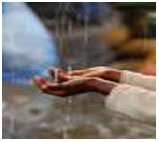No Grievances with the Rains /kïrәmt/!
Instead
of blaming nature, it’s time we looked inward.
This year, the rains in Ethiopia
seem unusually prolonged—seem, not necessarily are. Compared to
the relatively drier past couple of years, they feel heavier and more frequent.
But let’s be honest: just because recent years have seen less intense rainfall
doesn’t mean the rains this year are unnatural or out of place. They’re simply
part of a recurring, essential pattern.
Traditionally, our rainy season
concludes around the first week of Tïk’ïmt (October). But even before that,
many people start to grumble. Just the other day, sitting at a local restaurant
in Addis Ababa, I overheard a man complaining at full volume about the
downpours—calling them “excessive,” even “reckless.” It was clear he’d had
enough of the weather.
But here’s a reality check: rain
operates on nature’s time, not ours. It comes when it must and leaves when its
purpose is fulfilled. This is the rhythm of the earth. Complaining about it is
like yelling at the sun for rising too early.
A poet once summed up human nature
brilliantly:
“As a rule, man is a fool.
When it’s hot, he wants it cool.
And when it’s cool, he wants it hot.
Always wanting what is not.”
So true. We often fail to appreciate
what is good and natural, simply because it arrives in a form we didn’t expect.
The
Real Cause of Flooding
The same man in the restaurant went
on to blame the rains for damaging the new highway infrastructure—the k’әlәbәt
mәngәd—and for poor drainage in the city. But let’s be fair. Yes, heavy
rain can cause temporary flooding, fallen trees, even loss of life. Yet the
blame for poor drainage systems doesn't lie with the rain. It lies with us.
When people clog water ducts and
gutters with trash, what else do we expect but flooding? Most of these drainage
issues are the result of human negligence—reckless littering and an
indifference to public infrastructure. Rain doesn’t decide where to flow; we
do, by how well we maintain our environment.
In truth, we often create our own
problems, and the solutions are usually within reach. Keeping our streets clean
and water passages free of waste isn’t a monumental task—it’s a civic duty.
A
Deeper Reflection
So why do some people, like that
man, refuse to see the root cause? Why do we deflect blame onto nature instead
of accepting responsibility?
This isn’t just about the weather—it’s
a cultural mindset. A refusal to call a spade a spade. And it’s this same
attitude that stalls development, accountability, and growth.
Psychologist Albert Ellis once said:
“The best years of your life are the
ones in which you decide your problems are your own.
You don't blame them on your mother, the ecology, or the President.
You realize that you control your own destiny.”
It’s a hard truth—but a liberating
one.
Rain
Is a Blessing, Not a Burden
 So to that man—and to others who
share his view—I say: don’t criticize the rain. Criticize the way we prepare
for it. Don’t resent nature’s rhythm; adapt to it and protect it. Rain is not a
nuisance. It is a sacred blessing that waters our crops, fills our reservoirs,
and sustains our lives.
So to that man—and to others who
share his view—I say: don’t criticize the rain. Criticize the way we prepare
for it. Don’t resent nature’s rhythm; adapt to it and protect it. Rain is not a
nuisance. It is a sacred blessing that waters our crops, fills our reservoirs,
and sustains our lives.
Let us not bear grievances against one of the earth’s greatest gifts. Instead, let’s cultivate a culture of responsibility, foresight, and gratitude.
God bless Ethiopia and the world
with rain—for in it lies the promise of life.





Comments